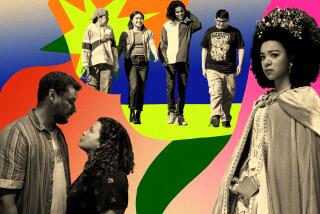TV Picks: ‘Futurama,’ ‘The Hustle,’ child activists, ‘Wilfred’
“Futurama” (Comedy Central, Wednesdays). Science fiction and comedy are “like that.” (Writer crosses fingers to indicate closeness.) Each takes emerging facts to their extreme, often absurd conclusions; both are fundamentally philosophical — though each has time for exhilarating idiocy — and in imagining what might be, each takes the measure of what is. “1984” was about “1948,” and “Brave New World” is a funny book. Created by Matt Groening, who invented “The Simpsons” and changed the world, and developed with David X. Cohen, “Futurama” fuses the two forms as if in the warp core of some spaceship I am imagining as I type. It has to some extent labored under the shadow of its more eligible look-alike older cousin and echoes it here and there — 20th-century pizza delivery boy Fry (Billy West) is, like Homer Simpson, a distractible lunkhead, while Bender (John DiMaggio) is the mechanical man Bart might have grown up to be had he been born a robot — but is very much its own creature, with its own interests. Its return this week, marking the second half of its seventh and final season, opens with back-to-back episodes: “2-D Blacktop” mixes a “Fast and Furious” takeoff with a brilliant riff on “Flatland” (this is the only series on television you’re likely to encounter a line like “You kids and your topology”); “Fry and Leela’s Big Fling” combines a “Planet of the Apes” riff with something I saw once on “Twilight Zone” (if memory serves) as Fry and sexy cyclops Leela (Katey Sagal) try to get alone.
RELATED: Movie reviews by The Times
“The Hustle” (Fuse, Wednesdays). The first scripted series from the basic-cable mostly-music network Fuse follows the fortunes of a Brooklyn rap duo breaking out from the underground. Created by Prentice Penny (who has written for “Happy Endings,” “Scrubs” and “Girlfriends”), it has some of the scrappy casual realism of HBO’s late and personally lamented “How to Make It in America” and is as smart and serious about music-making and the music business as is “Nashville,” without its distracting high gloss and dramatic extremity. It has a swinging, lo-fi, New Wave vibe that suits the action and milieu; affordable modern technology lets you do a lot with a little these days (in film as in music), but whether imposed or self-selected the constraints on the production have a salutary effect. I can’t say how accurate it is to the world it represents; some aspects of the plot are well-worn tropes of the show-business drama, and the editing can be a little hectic at times that hectic is not called for. But it feels right; it doesn’t strain for effect. Penny has created a cast of mostly sweet, human characters embodying a range of awareness; it’s not just that the more responsible ones balance the dunderheads but that each contains elements of responsibility and dunderheadedness. Y’Lan Noel and L.A.-based stand-up comic London Brown play the rappers who constitute Brooklyn’s finest. (Brown, who plays the charismatic one, is that.) Erica Dickerson is their manager, and Clinton Lowe the comic relief. (But no Turtle.)
“The Revolutionary Optimists” (PBS, Monday). Nicole Newnham and Maren Grainger-Monsen directed this vibrant documentary set in a 9,000-person shantytown in Kolkata, the city formerly written as Calcutta, India. Some critics have dunned the film for lacking a coherent narrative, as if that were something life ever supplied; there is progress for some of its characters and regress for others, and, as in many documentaries it is left to the closing titles to say how the world has gotten on since we left them. There are times, to be sure, that one is not exactly sure how this bit fits with that, but it is also the bits that emotionally matter most: an excited young face, a colorful sari in a dun-colored brickyard, a man and his students dancing in a corridor. The man is Amlan Ganguly, a lawyer turned teacher and activist, and by his own lights an odd duck among his people (his interest in dance and art set him apart), who works for and alongside the young to change their lives, and the future, and everything. His co-stars include two bright and erudite pre-teens, Salim and Sikha, who go hither and yon to alert their neighbors to polio vaccines, break the soccer-gender barrier, bring drinkable water to their neighborhood and put the lie to “tradition,” the awful excuse by which the powerful, even among the powerless, strive to keep others weak. An intimate film about big issues, it’s both saddening and uplifting; on the one hand the facts of the larger world point to continued bad weather; on the other, rays of human sunshine continue to break out.
“Wilfred” (FX, Thursdays). The story of a boy (a man, nominally) and (more or less) his dog, whom he sees as a human in a costume where everyone else sees an animal, is back for a third season. It is in some ways the story of the comfort we take from other breathing things, but it is also a story of territorial marking and jealousy and of how we encourage the bad habits of others to support our own. The series is inevitably frustrating in that it needs to keep protagonist Ryan (Elijah Wood) from any sort of settled state, but it is also funny and deftly played; Wood is born to play put-upon heroes (I include those Hobbit movies) and as Wilfred, the dog, Jason Gann (who originated the role in the FX series’ Australian forerunner) is wonderfully at once a person and a beast. It seems worth mentioning, just because it’s unusual in series TV, that Randall Einhorn has directed nearly every episode and continues to.
More to Read
The complete guide to home viewing
Get Screen Gab for everything about the TV shows and streaming movies everyone’s talking about.
You may occasionally receive promotional content from the Los Angeles Times.







